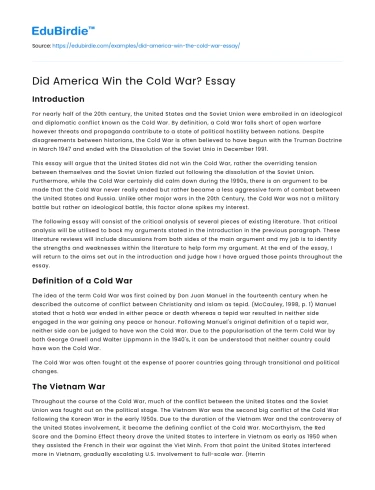Introduction
For nearly half of the 20th century, the United States and the Soviet Union were embroiled in an ideological and diplomatic conflict known as the Cold War. By definition, a Cold War falls short of open warfare however threats and propaganda contribute to a state of political hostility between nations. Despite disagreements between historians, the Cold War is often believed to have begun with the Truman Doctrine in March 1947 and ended with the Dissolution of the Soviet Unio in December 1991.
This essay will argue that the United States did not win the Cold War, rather the overriding tension between themselves and the Soviet Union fizzled out following the dissolution of the Soviet Union. Furthermore, while the Cold War certainly did calm down during the 1990s, there is an argument to be made that the Cold War never really ended but rather became a less aggressive form of combat between the United States and Russia. Unlike other major wars in the 20th Century, the Cold War was not a military battle but rather an ideological battle, this factor alone spikes my interest.
Save your time!
We can take care of your essay
- Proper editing and formatting
- Free revision, title page, and bibliography
- Flexible prices and money-back guarantee
The following essay will consist of the critical analysis of several pieces of existing literature. That critical analysis will be utilised to back my arguments stated in the introduction in the previous paragraph. These literature reviews will include discussions from both sides of the main argument and my job is to identify the strengths and weaknesses within the literature to help form my argument. At the end of the essay, I will return to the aims set out in the introduction and judge how I have argued those points throughout the essay.
Definition of a Cold War
The idea of the term Cold War was first coined by Don Juan Manuel in the fourteenth century when he described the outcome of conflict between Christianity and Islam as tepid. (McCauley, 1998, p. 1) Manuel stated that a hotâ war ended in either peace or death whereas a tepid war resulted in neither side engaged in the war gaining any peace or honour. Following Manuel's original definition of a tepid war, neither side can be judged to have won the Cold War. Due to the popularisation of the term Cold War by both George Orwell and Walter Lippmann in the 1940's, it can be understood that neither country could have won the Cold War.
The Cold War was often fought at the expense of poorer countries going through transitional and political changes.
The Vietnam War
Throughout the course of the Cold War, much of the conflict between the United States and the Soviet Union was fought out on the political stage. The Vietnam War was the second big conflict of the Cold War following the Korean War in the early 1950s. Due to the duration of the Vietnam War and the controversy of the United States involvement, it became the defining conflict of the Cold War. McCarthyism, the Red Scare and the Domino Effect theory drove the United States to interfere in Vietnam as early as 1950 when they assisted the French in their war against the Viet Minh. From that point the United States interfered more in Vietnam, gradually escalating U.S. involvement to full-scale war. (Herring, 2004, p. 19)
The Dissolution of the Soviet Union
Debate is often had as to when the dissolution of the Soviet Union actually happened as it was a gradual process of the Soviets relinquishing power in the Eastern bloc following unrest in several countries. As McCauley states, many people would say 1990, when Gorbachev declared it to be over. (McCauley, 1998, p. 7) Ultimately, the debate as to when the Cold War ended is a result of the type of war that was waged as it did not require an American victory to end but instead the collapse of the Soviet Union. The Cold War's end was a baby that arrived unexpectedly, but a long like for those claiming paternity has quickly formed.






 Stuck on your essay?
Stuck on your essay?

